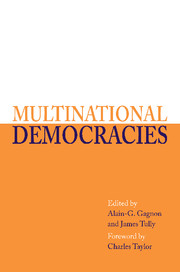Book contents
- Frontmatter
- Contents
- Notes on the contributors
- Foreword by Charles Taylor
- Acknowledgements
- Introduction
- Part I Justice and stability in multinational democracies
- Part II Struggles over recognition and institutions of accommodation
- 5 Federalism, federation and collective identities in Canada and Belgium: different routes, similar fragmentation
- 6 Recognition claims, partisan politics and institutional constraints: Belgium, Spain and Canada in a comparative perspective
- 7 Ethnoterritorial concurrence in multinational societies: the Spanish comunidades autónomas
- 8 Mutual recognition and the accommodation of national diversity: constitutional justice in Northern Ireland
- 9 Federalist language policies: the cases of Canada and Spain
- 10 Competing national visions: Canada–Quebec relations in a comparative perspective
- Part III Modes of reconciliation and conflict management
- References
- Index
6 - Recognition claims, partisan politics and institutional constraints: Belgium, Spain and Canada in a comparative perspective
Published online by Cambridge University Press: 06 October 2009
- Frontmatter
- Contents
- Notes on the contributors
- Foreword by Charles Taylor
- Acknowledgements
- Introduction
- Part I Justice and stability in multinational democracies
- Part II Struggles over recognition and institutions of accommodation
- 5 Federalism, federation and collective identities in Canada and Belgium: different routes, similar fragmentation
- 6 Recognition claims, partisan politics and institutional constraints: Belgium, Spain and Canada in a comparative perspective
- 7 Ethnoterritorial concurrence in multinational societies: the Spanish comunidades autónomas
- 8 Mutual recognition and the accommodation of national diversity: constitutional justice in Northern Ireland
- 9 Federalist language policies: the cases of Canada and Spain
- 10 Competing national visions: Canada–Quebec relations in a comparative perspective
- Part III Modes of reconciliation and conflict management
- References
- Index
Summary
Claims for recognition and autonomy have permeated politics in Belgium, Spain and Canada over the last several decades. The transformation in these states' party systems and the debates over their constitutional and institutional arrangements are signs that nationalist movements have been successful in putting their issues on the political agenda. Indeed, the emergence of autonomist or secessionist nationalist parties in Spain and Canada and the split on linguistic lines of the traditional Belgian parties have transformed the political landscape of these societies. These political parties have attempted to rearrange, with varying success, the constitutional and institutional framework. In turn, this framework has shaped their action, posing constraints and offering opportunities. While the action of political parties seeking recognition and autonomy for their communities has introduced an element of instability in the larger societies' political system, the response to their challenge has been instrumental in determining its ultimate consequences.
This chapter addresses two related questions. First, it will show how collective identities in Belgium, Spain and Canada have been institutionalized in partisan politics and how the political parties reflective of these identities have emerged to challenge the constitutional and institutional framework in which they operate. It will also show that these parties may transform a party system in a way that makes it an enduring source of instability.
- Type
- Chapter
- Information
- Multinational Democracies , pp. 176 - 200Publisher: Cambridge University PressPrint publication year: 2001
- 3
- Cited by



